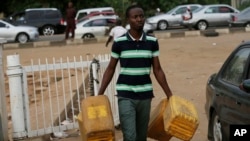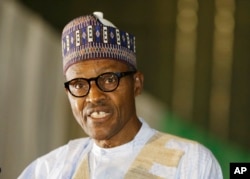Nigeria produces more oil than any other country in Africa. But it nearly ran out of fuel the country needs to power its generators, cars and airplanes over the past week. How could this happen?
Nigeria practically ground to a halt over the past few days because there was no fuel at the pumps. As the generators that Nigerians rely on for 24-hour power ran dry, businesses began closing down. Telecoms announced cuts in their service. Airlines canceled days of flights. Banks closed early. The crisis was nationwide.
Problem for businesses
In the northern city of Kaduna, Abdullahi Musa says he would rather shut down the cyber café that he runs than stand in line for hours for gas that is not there.
“To buy fuel is a problem, to run the business is a problem, to feed your family is a problem. So I don’t think there’s any reason for you to continue running the business that you are continue losing, losing all the time because of issue of light, because of issue of fuel scarcity,” he said.
Ismail Onipilo, a businessman who travels around Nigeria, says the only way to get fuel is to pay exorbitant prices — if you can get it at all.
“In Ibadan, I’m aware that in some filling stations they sell as high as 350 Naira per-liter. You know, so, the thing is affecting almost everybody,” he said.
The price Onipilo mentions is equivalent to about $1.75 per liter — lower than in many countries, but much higher than people in fuel-subsidized Nigeria are used to paying.
Dilapidated infrastructure
It is not that there is no oil in Nigeria — the country produces about two million barrels per-day. But you can not put crude in a gas tank, and Nigeria’s refineries are dilapidated. So the country imports its refined products, and the government pays marketers a subsidy to keep the price stable.
There in lies the problem. The unions and associations involved in importing fuel say the government owes them about $1 billion in unpaid subsidies. They embarked on a strike earlier this month that they only called off this week.
It is no coincidence that this is all happening just days before new president Muhammadu Buhari is set to be inaugurated, says Chuba Ezekwesili, a research analyst at the Nigerian Economic Summit Group.
“They feel that they’re being owed by the current government. I think the fear is that with the incoming government, there’s no guarantee that they’re going to be paid what they’re being owed,” said Ezekwesili.
The shortage highlights the inherent fragility of Africa’s largest economy. Nigeria may be home to major pan-African banks, a vibrant movie and music industry and, of course, a massive oil sector. But without a reliable electric grid, Ezekwesili said it will continue to remain vulnerable to shocks like this shortage of petroleum products.
“When you have a scarcity of those, businesses can’t operate, because you can’t go day-to-day without those commodities, and without those essentials, and especially when those essentials, the prices are skyrocketing,” said Ezekwesili.
The fuel marketers are not the only ones not getting paid; civil servants in several of Nigeria’s 36 sates say they are owed money too. It is another mess for Buhari to sort out when he takes office on Friday.
Ibrahima Yakubu in Kaduna, Nigeria contributed reporting.








